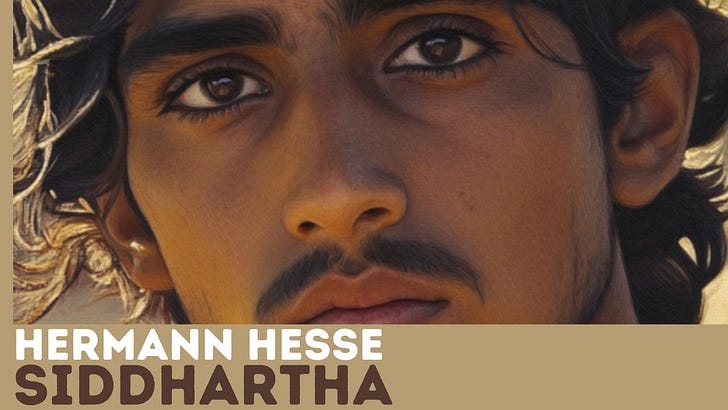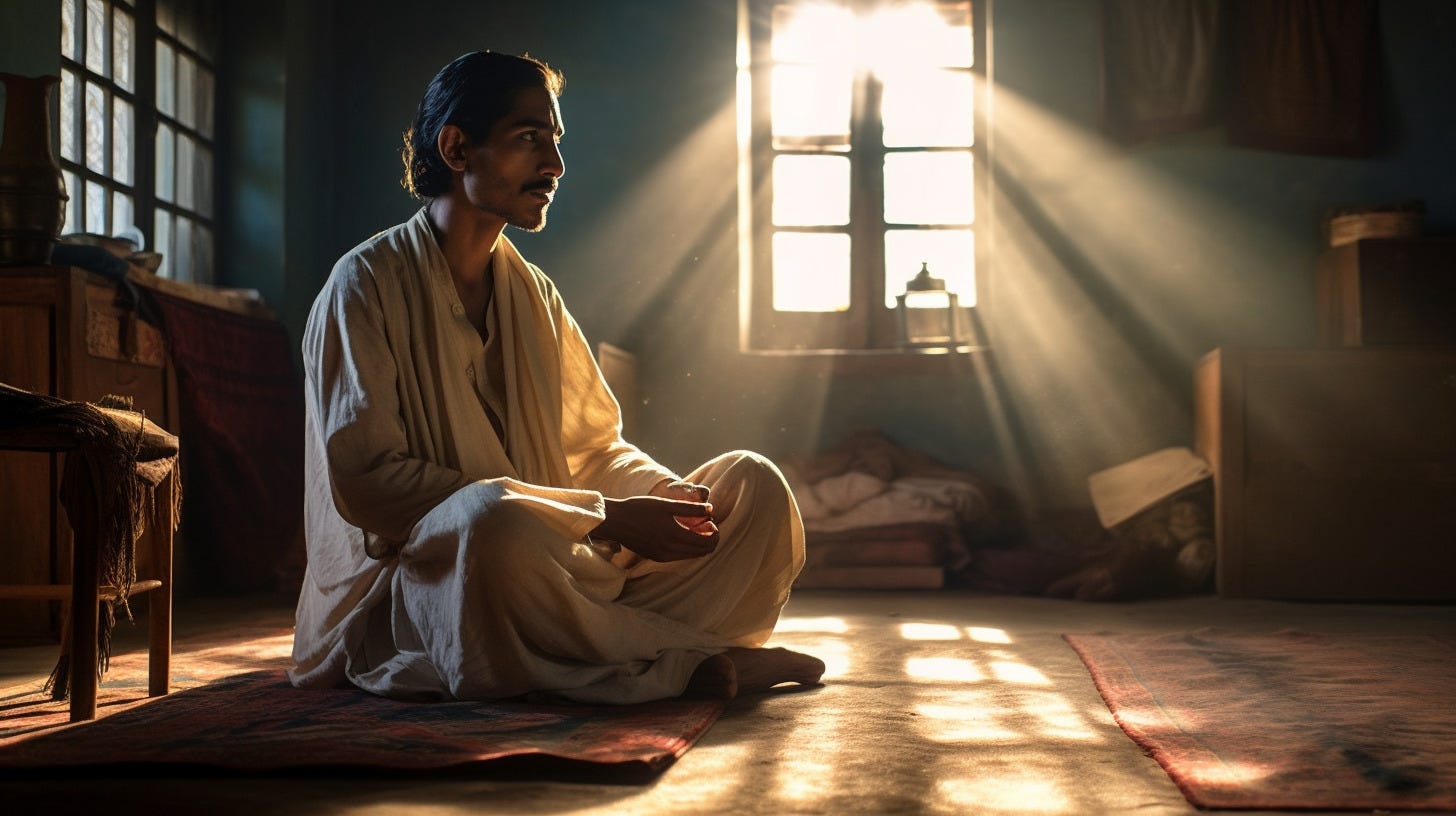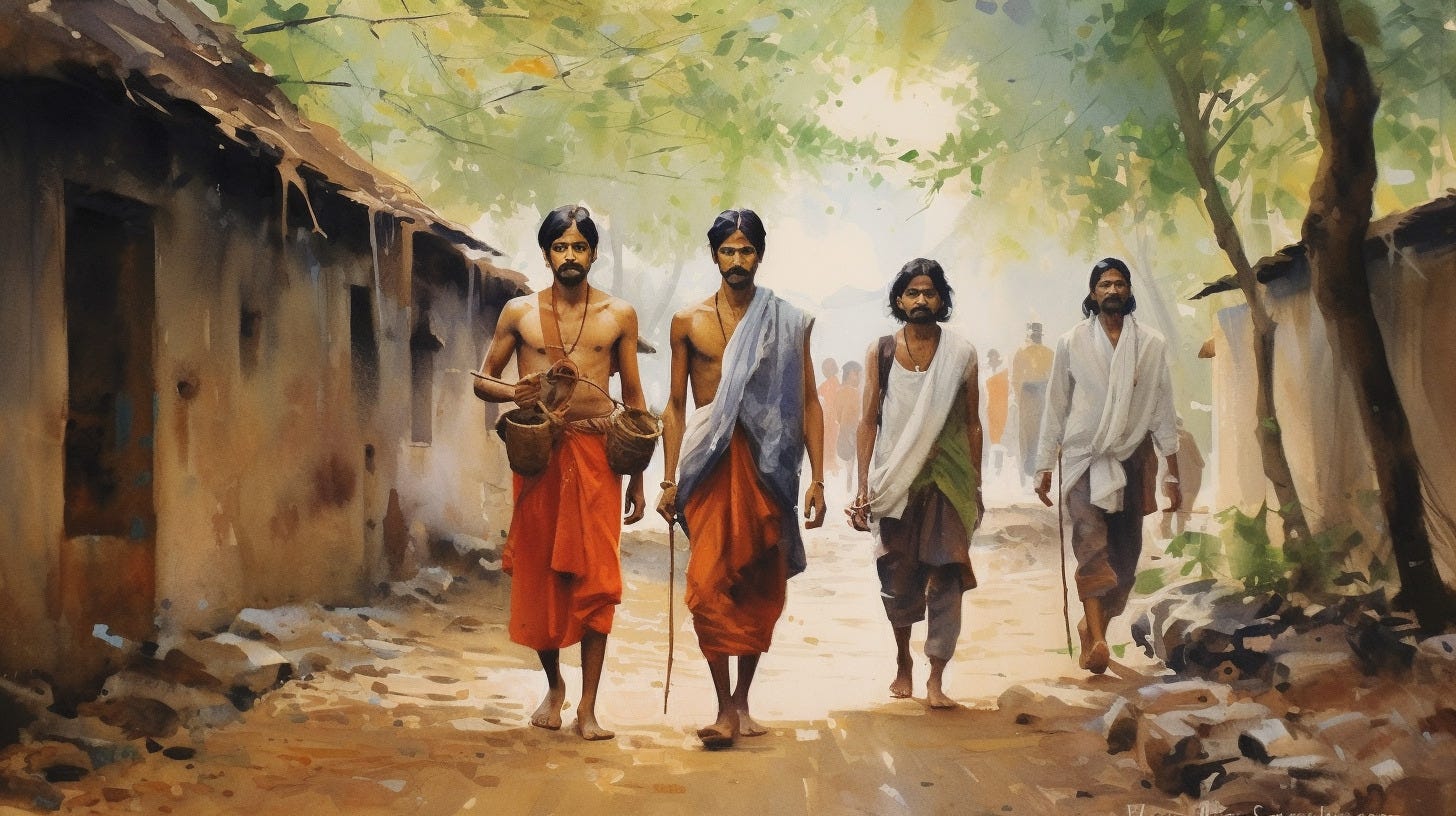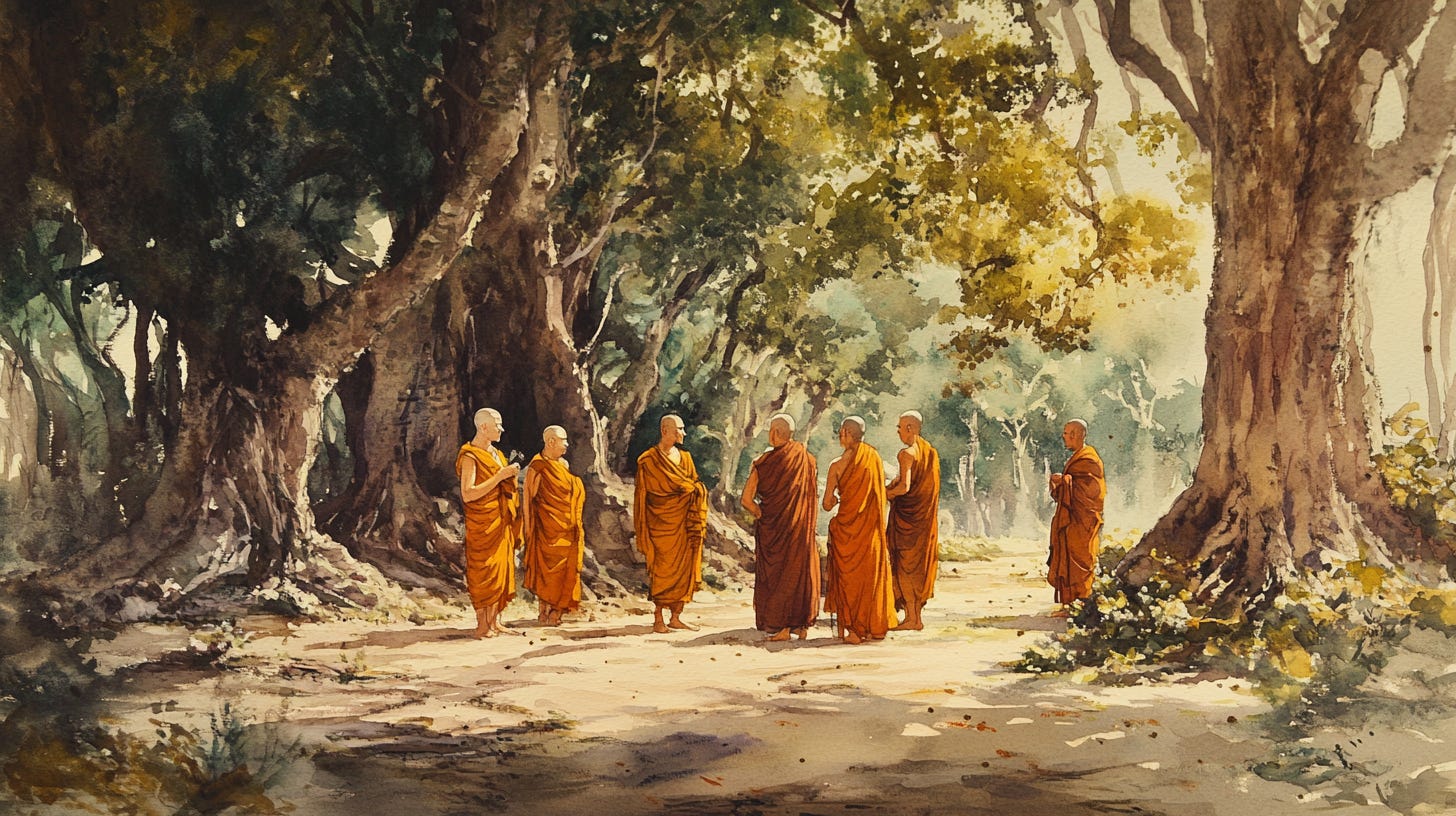Welcome back to EveryDawn!
We’ve already begun talking about Hesse — in the previous two articles we discussed Romanticism, and how Hermann Hesse was really a late German Romantic.
Today I’d like to tell you Hesse’s book Siddhartha, a book that I’ve read and loved all my life. I discovered it maybe at 15 or 16, on my mother’s bookshelf in a now far-away, two-room flat outside of Athens, Greece. I borrowed it right there and never returned it. It is here with me now, forty years later, and it has been all this time. When I moved to Germany to study, when I moved to Hong Kong to work — this little volume has never been out of my arm’s reach. When I went for a holiday back to Greece this past month, it was the only physical book I had with me in my hand-luggage, as it always is — just in case the power runs out on my reading tablet or I’m stuck on a desert island after a plane crash with nothing else to read. I must have read this book hundreds of times over the years — in full and in excerpts, reading a page or two before sleep, or going through the whole tale once again, from beginning to end, on a conference trip or a holiday. And still, it’s the only book I can imagine reading over and over again. If I was stranded somewhere with only one book, it wouldn’t be the Bible or Plato’s works, it wouldn’t be Neruda’s poems or the Dao, and it wouldn’t even be the Hitchhiker’s Guide to the Galaxy. It would certainly be this one small volume, barely a hundred pages long, but a book that contains the whole world of what it means to be human within it.
Come with me for a short while, and let’s have a look at it together!
The Son of the Brahman
In the shade of the house, in the sunshine of the riverbank near the boats, in the shade of the Sal-wood forest, in the shade of the fig tree is where Siddhartha grew up, the handsome son of the Brahman, the young falcon, together with his friend Govinda, son of a Brahman. The sun tanned his light shoulders by the banks of the river when bathing, performing the sacred ablutions, the sacred offerings. In the mango grove, shade poured into his black eyes, when playing as a boy, when his mother sang, when the sacred offerings were made, when his father, the scholar, taught him, when the wise men talked.
Thus begins one of the most remarkable books of the 20th century. To feel the impact of the language, you have to read it out loud, slowly, like a poem, letting the words flow, letting the repetitions unfold their rhythm, just like rhapsodes would have memorised the ancient epics in exactly the same way, following the same repetitions, the same music of the words. Thankfully, the translation here preserves much of the sound of the German.
Henry Miller, another one of the writers I’d like to talk about in a future post, once said that this book, Hermann Hesse’s Siddhartha, was a “more potent medicine than the New Testament.” In the 1960s, after Hesse’s death, some of his works were embraced as inspiration by the US counter-culture movements. Timothy Leary was a fan of Hesse’s work and Kurt Vonnegut thought that this book was Hesse’s “simplest, clearest, most innocent tale of seeking and finding.”
But Henry Miller’s, Robert Pirsig’s and Kerouac’s works, all similarly inspirational, are read today mostly for their historical value, rather than as lived (and living) experiences. Hesse, in contrast, managed to create a work that, by being set in an almost-mythical time and place, transcends fashion and historical contingencies and speaks directly to every reader, no matter whether they live in 1920’s Switzerland, 1960’s San Francisco or 2020’s Shenzhen.
The book tells the story of a young man, Siddhartha, an educated and well-off son of a high-caste priest in a village in India, at the time of the Buddha’s life. It is no accident that Siddhartha shares his name with the Buddha himself: throughout the book he goes on a journey of enlightenment that lets him live many lives. Siddhartha becomes a hermit, a merchant, a lover, a broken man. And it is only at the end of this journey that he finally is able to find what he is looking for.
Beginnings
The story starts in the ancestral village where Siddhartha grows up, a handsome, educated, promising young man:
For a long time, Siddhartha had been partaking in the discussions of the wise men, practising debate with Govinda, practising with Govinda the art of reflection, the service of meditation. He already knew how to speak the Om silently, the word of words, to speak it silently into himself while inhaling, to speak it silently out of himself while exhaling, with all the concentration of his soul, the forehead surrounded by the glow of the clear-thinking spirit. He already knew to feel Atman in the depths of his being, indestructible, one with the universe.
He is not only good at the spiritual teachings — he’s also popular among his family and friends:
Joy leapt in his father’s heart for his son who was quick to learn, thirsty for knowledge; he saw him growing up to become great wise man and priest, a prince among the Brahmans.
Bliss leapt in his mother’s breast when she saw him, when she saw him walking, when she saw him sit down and get up, Siddhartha, strong, handsome, he who was walking on slender legs, greeting her with perfect respect.
Love touched the hearts of the Brahmans’ young daughters when Siddhartha walked through the lanes of the town with the luminous forehead, with the eye of a king, with his slim hips.
But as much as he is loved by everyone, Siddhartha is not at ease with himself.
Siddhartha had started to nurse discontent in himself, he had started to feel that the love of his father and the love of his mother, and also the love of his friend, Govinda, would not bring him joy for ever and ever, would not nurse him, feed him, satisfy him. He had started to suspect that his venerable father and his other teachers, that the wise Brahmans had already revealed to him the most and best of their wisdom, that they had already filled his expecting vessel with their richness, and the vessel was not full, the spirit was not content, the soul was not calm, the heart was not satisfied.
And then, one day, a group of ascetics come through Siddharta’s town:
Three skinny, withered men, neither old nor young, with dusty and bloody shoulders, almost naked, scorched by the sun, surrounded by loneliness, strangers and enemies to the world, strangers and lank jackals in the realm of humans. Behind them blew a hot scent of quiet passion, of destructive service, of merciless self-denial.
And Siddharta knows: If there is a secret that has yet eluded him, if there is wisdom that he does not yet have, these men must be in possession of it.
In the evening, after the hour of contemplation, Siddhartha spoke to Govinda: “Early tomorrow morning, my friend, Siddhartha will go to the Samanas. He will become a Samana.”
His friend is as surprised by this decision as his father is appalled. But in the end, neither his father’s opposition nor his friends attempts to convince him are successful. One early morning, Siddhartha leaves everything behind and walks towards the edge of his village, following the footsteps of the three naked ascetics:
As he slowly left on stiff legs in the first light of day the still quiet town, a shadow rose near the last hut, who had crouched there, and joined the pilgrim — Govinda.
“You have come,” said Siddhartha and smiled.
“I have come,” said Govinda.
Samana life
Siddhartha and Govinda stay with the Samanas for three years and learn to live like them. They learn to fast, to hunger, to kill the desires of their bodies, to become almost pure soul:
Instructed by the oldest of the Samanas, Siddhartha practised self-denial, practised meditation, according to a new Samana rules. A heron flew over the bamboo forest — and Siddhartha accepted the heron into his soul, flew over forest and mountains, was a heron, ate fish, felt the pangs of a heron’s hunger, spoke the heron’s croak, died a heron’s death. A dead jackal was lying on the sandy bank, and Siddhartha’s soul slipped inside the body, was the dead jackal, lay on the banks, got bloated, stank, decayed, was dismembered by hyaenas, was skinned by vultures, turned into a skeleton, turned to dust, was blown across the fields. And Siddhartha’s soul returned, had died, had decayed, was scattered as dust, had tasted the gloomy intoxication of the cycle, awaited in new thirst like a hunter in the gap, where he could escape from the cycle, where the end of the causes, where an eternity without suffering began.
But we see at the end of this passage already the seed of what is to come: although Siddhartha can escape his desires, his upbringing, his knowledge, his social role, he cannot escape the cycles of death and re-incarnation. The eternity without suffering stays eternally out of reach.
And so, when one day word of a new teaching reaches them, Siddhartha is ready to leave the Samanas and seek enlightenment elsewhere:
A man had appeared, Gotama by name, the exalted one, the Buddha, he had overcome the suffering of the world in himself and had halted the cycle of rebirths. He was said to wander through the land, teaching, surrounded by disciples, without possession, without home, without a wife, in the yellow cloak of an ascetic, but with a cheerful brow, a man of bliss, and Brahmans and princes would bow down before him and would become his students.
So he and Govinda go to find the Buddha. It is not difficult to follow the rumours and the sightings of the holy man and his disciples, and after a while they meet him. In a memorable scene Siddhartha and the Buddha very briefly meet and exchange a few words:
“I wish that you, oh exalted one, would not be angry with me,” said the young man. ... “But let me say this one more thing: I have not doubted in you for a single moment. I have not doubted for a single moment that you are Buddha, that you have reached the goal, the highest goal towards which so many thousands of Brahmans and sons of Brahmans are on their way. You have found salvation from death. It has come to you in the course of your own search, on your own path, through thoughts, through meditation, through realizations, through enlightenment. It has not come to you by means of teachings! And — thus is my thought, oh exalted one, — nobody will obtain salvation by means of teachings! ... This is what I have thought and realized, when I have heard the teachings. This is why I am continuing my travels — not to seek other, better teachings, for I know there are none, but to depart from all teachings and all teachers and to reach my goal by myself or to die. But often, I’ll think of this day, oh exalted one, and of this hour, when my eyes beheld a holy man.”
Govinda will stay with the Buddha, and so, after going through much together, the two friends finally part. Govinda takes the yellow robe of the monk, while Siddhartha goes back onto the dusty country road, to find his own salvation or his own death:
“How deaf and stupid have I been!” he thought, walking swiftly along. “When someone reads a text, wants to discover its meaning, he will not scorn the symbols and letters and call them deceptions, coincidence, and worthless hull, but he will read them, he will study and love them, letter by letter. But I, who wanted to read the book of the world and the book of my own being, I have, for the sake of a meaning I had anticipated before I read, scorned the symbols and letters, I called the visible world a deception, called my eyes and my tongue coincidental and worthless forms without substance. No, this is over, I have awakened, I have indeed awakened and have not been born before this very day.”
In thinking these thoughts, Siddhartha stopped once again, suddenly, as if there was a snake lying in front of him on the path.
Because suddenly, he had also become aware of this: He, who was indeed like someone who had just woken up or like a new-born baby, he had to start his life anew and start again at the very beginning. When he had left in this very morning from the grove Jetavana, the grove of that exalted one, already awakening, already on the path towards himself, he had every intention, regarded as natural and took for granted, that he, after years as an ascetic, would return to his home and his father. But now, only in this moment, when he stopped as if a snake was lying on his path, he also awoke to this realization: “But I am no longer the one I was, I am no ascetic any more, I am not a priest any more, I am no Brahman any more. Whatever should I do at home and at my father’s place? Study? Make offerings? Practise meditation? But all this is over, all of this is no longer alongside my path.”
Motionless, Siddhartha remained standing there, and for the time of one moment and breath, his heart felt cold, he felt a cold in his chest, as a small animal, a bird or a rabbit, would when seeing how alone he was. For many years, he had been without home and had felt nothing. Now, he felt it. Still, even in the deepest meditation, he had been his father’s son, had been a Brahman, of a high caste, a cleric. Now, he was nothing but Siddhartha, the awoken one, nothing else was left. ...
Out of this moment, when the world melted away all around him, when he stood alone like a star in the sky, out of this moment of a cold and despair, Siddhartha emerged, more a self than before, more firmly concentrated. He felt: This had been the last tremor of the awakening, the last struggle of this birth. And it was not long until he walked again in long strides, started to proceed swiftly and impatiently, heading no longer for home, no longer to his father, no longer back.
And here ends the first part of the book. Hesse took a break before continuing with the story. He wrote that he found it difficult to write the second part, because he did not himself have the experiences that he wanted Siddhartha to have. In the end, Siddhartha will achieve the wisdom he is looking for, but not in the way he thought.
This post is getting too long for an email, so let me stop here for today. Next week, we will see how the tale unfolds further on and we will discuss a few points of note regarding Hesse’s Siddhartha, in my opinion one of the greatest novels ever written.
By the way, if you’d like to read it, you can find it here in an older English translation (the one quoted in this article):
https://www.gutenberg.org/files/2500/2500-h/2500-h.htm
And here in the original German:
https://www.gutenberg.org/cache/epub/2499/pg2499.html
Of course, you can also buy it as a book on Amazon or any other bookshop of your choice.
Thanks for being here! The images are generated by Midjourney, and there are many more of them in the video linked at the beginning of this post!







